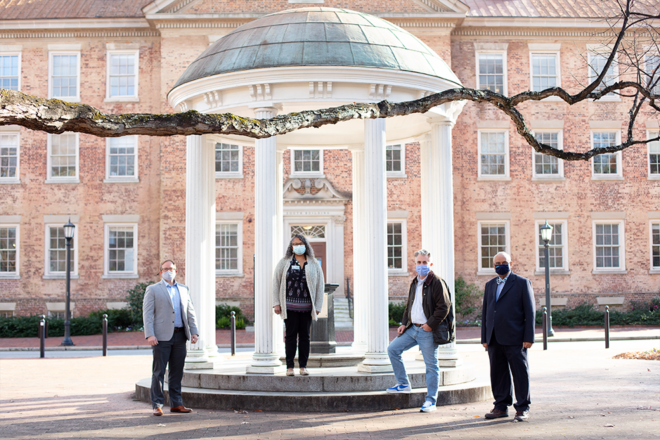UNC-Chapel Hill faculty and graduate students create the I4 Boundary Spanners program to address local COVID-19 concerns by combining data analysis with firsthand community perspectives.

January 4, 2021
By Shellie Edge
Photography by Sarah Daniels
Published by Innovate Carolina
What started out as thoughtful conversation between University of North Carolina at Chapel-Hill colleagues on the 2019 Tar Heel Bus Tour has turned into a successful pilot program that engages communities through data science, public policy and service to address community-specific needs during the COVID-19 pandemic.
United not only by the Bus Tour but also in the mindset to bolster communities across the state, five colleagues and fast friends are helping UNC-Chapel Hill graduate students strengthen local communities by providing relevant and time-sensitive data to legislators and other leaders across North Carolina to help guide the continuing and future pandemic response.
Sponsored by the UNC-Chapel Hill Graduate School, Southern Futures Initiative, and the North Carolina Policy Collaboratory, which was established by the North Carolina General Assembly (NCGA) in 2016 to deploy the collective research and policy expertise of UNC System faculty and staff for practical use, the I4 Boundary Spanners launched as a focused, six-month program this past summer (the four Is being Include, Identify, Investigate and Influence). The program is one of more than 85 research projects underway across 14 UNC System schools. Funded by a $29 million appropriation by the NCGA to the Collaboratory in May 2020, the funding supports research on treatment, community testing and prevention of COVID-19. I4 Boundary Spanners is among a subset of 15 faculty projects – from among the 45+ total Collaboratory-funded COVID projects at UNC-Chapel Hill – that is working with Innovate Carolina and the Institute for Convergent Science to apply a rapid innovation methodology designed to speed its results.
The mission of the program is to train a diverse group of Carolina graduate students as I4 Boundary Spanners: students who appreciate and can mobilize the dataverse to empower their communities to include, identify, investigate and influence around issues that impact their physical, environmental and economic health. A group of five faculty united to create and launch the I4 Boundary Spanners pilot program:
- Deb Aikat, associate professor at the Hussman School of Journalism and Media
- Suzanne Barbour, dean of the Graduate School and professor of biochemistry and biophysics at the School of Medicine
- Jason Cramer, director of experiential professional development for The Graduate School
- Malinda Maynor Lowery, professor of history and director of the Center for the Study of the American South
- Jeff Warren, executive director of the North Carolina Policy Collaboratory and adjunct associate professor of geological sciences
Within the I4 Boundary Spanners program, part of the training that graduate students receive is focused on humanistic skills. Graduate students benefit from working across disciplines and centering stories of how policy impacts real people. Students are not just working with quantitative data but also with qualitative data leverage the power of people’s stories to affect change in their communities.
“I4 Boundary Spanners is all about the synergies built from conversations, which underscores what the NC Policy Collaboratory strives to be,” says Warren. “I love talking to legislators about the power that can be harnessed across the UNC System, working together across disciplines. That’s really important and what’s been missing from a lot of physical science research…the people quotient.”
For example, most legislators as well as the general public may see a science policy report as just numbers and graphs. But if those reports include historical interviews, video snippets of constituents, and the importance of a community issue to its residents, this combination of added elements adds texture that illustrates the applicability and impact of science to the real world in ways that raw data cannot.
The idea for I4 Boundary Spanners was sparked with the release of a report by the Committee on Equal Opportunities in Science and Engineering (CEOSE), which is a congressionally mandated advisory committee to the National Science Foundation (NSF) suggesting more can be done by the NSF in the space of community-engaged research as a way to enhance scientific pipelines and broaden participation.
“More and more, we’re seeing taxpayers who don’t trust science and don’t necessarily want to underwrite science,” says Barbour. “By putting students in the community where they can be the face of science, we have the opportunity to make science more approachable, more palatable, and hopefully more valued by communities.”

– Suzanne Barbour
Around this time, Barbour and Lowery re-connected over a Zoom meeting where they were learning about disparate impacts of COVID-19 across the state. READ MORE at this link on the Graduate School website.
